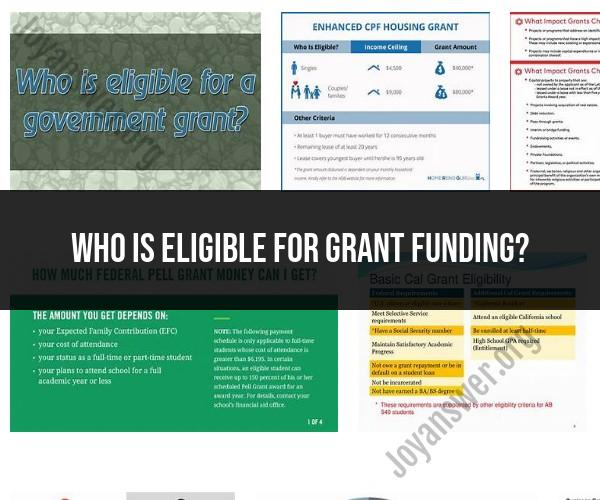Who is eligible for Grant funding?
Eligibility for grant funding can vary widely depending on the specific grant program, the organization or agency offering the grant, and the intended purpose of the grant. Grant eligibility criteria are typically outlined in the grant's guidelines and application instructions. Here are some common factors that may determine eligibility for grant funding:
Type of Grant: Grants are available for various purposes, including education, research, nonprofit organizations, small businesses, individuals, and community development. Eligibility depends on the type of grant you are applying for.
Geographic Location: Some grants are location-specific and may target specific regions, cities, states, or countries. Eligibility can depend on where you or your organization is located.
Nonprofit Status: Many grants are available exclusively to nonprofit organizations, such as charities, foundations, and community groups. To qualify, an organization typically needs to have obtained nonprofit status from the relevant government authority.
For-Profit Businesses: Some grants are designed for small businesses, startups, or entrepreneurs. Eligibility criteria may include factors like industry, size, and the potential impact of the business.
Individuals: Certain grants are awarded to individuals pursuing specific goals, such as education, research, or artistic projects. Eligibility may depend on factors like academic achievement, financial need, or expertise in a particular field.
Project or Program Specifics: Grants often have specific objectives, and eligibility may require that your project or program aligns with these objectives. You may need to demonstrate how your proposal addresses the grant's goals and priorities.
Demographics: Some grants target specific demographic groups, such as women, minorities, veterans, or individuals with disabilities. Eligibility may be based on your affiliation with a particular demographic.
Income Level: Certain grants are means-tested, meaning eligibility is determined by your income or financial need. You may need to provide financial documentation to demonstrate your eligibility.
Past Performance: Organizations applying for grants may be required to show a track record of successful projects or programs. Funders often consider an applicant's history of achieving results.
Compliance with Regulations: Eligibility may hinge on your compliance with relevant laws and regulations, such as tax compliance or environmental regulations.
Application Requirements: Meeting the specific requirements outlined in the grant application, including deadlines, requested documentation, and the format of the proposal, is crucial for eligibility.
Partnerships: Some grants require collaboration with other organizations or entities. Eligibility may depend on your ability to secure these partnerships.
Legal Status: You may need to have legal standing and be in good standing with government authorities to be eligible for certain grants.
Grant-Specific Criteria: Individual grants may have unique eligibility criteria. Always carefully review the grant guidelines and eligibility requirements provided by the grant issuer.
It's important to thoroughly research and review the eligibility criteria for each grant opportunity you are interested in pursuing. Applying for grants that align with your qualifications and goals will increase your chances of securing funding. Additionally, reaching out to the grant issuer or administrator for clarification on eligibility requirements can be helpful if you have specific questions.



